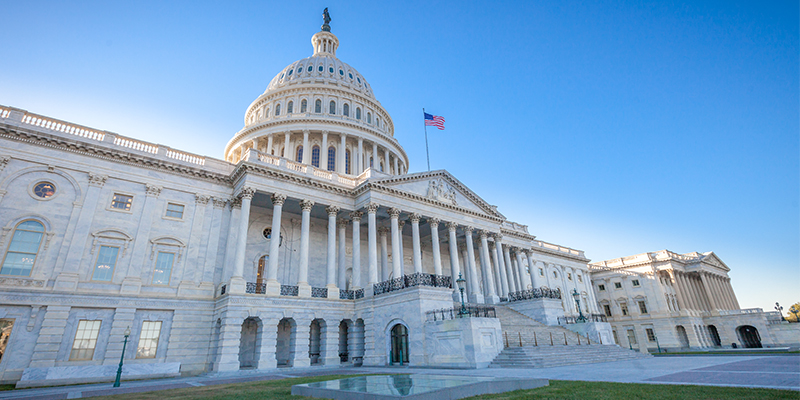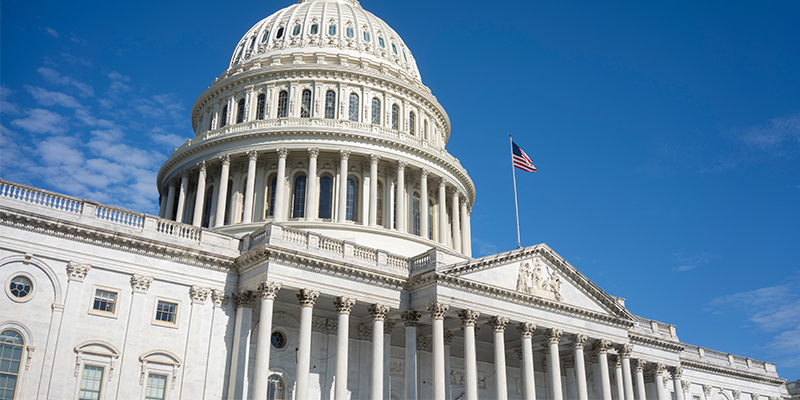The Senate is back in session this week, and the House of Representatives returns from its summer recess next week. But with the exception of a continuing budget resolution that needs to be passed by both chambers before an Oct. 1 deadline to prevent a government shutdown, the primary focus of both parties will be positioning for maximum political advantage as the midterm elections near.
The limited legislative agenda is due in large part to Democratic success in passing the Inflation Reduction Act of 2022, a $739 billion budget reconciliation bill containing major Democratic priorities on climate change, healthcare subsidies, and Medicare prescription drug pricing. This bill passed the Senate in early August after Senate Majority Leader Chuck Schumer (D-NY) and Senator Joe Manchin (D-WV) finally agreed on the outline of a bill, and the bill was subsequently passed by the House. That bill originally contained a proposal that would have changed tax law governing carried interests, or “promotes,” which would have hurt many real estate entrepreneurs and partnerships. The language was opposed by NAIOP and other national real estate groups and was dropped after Arizona Senator Kyrsten Sinema demanded its removal. Also left out of the bill were proposals in President Biden’s original “Build Back Better” legislation that would have, among other things, curtailed Section 1031 like-kind exchanges and increased capital gains taxes and ordinary income tax rates.
With congressional Democrats and the Biden administration having already achieved passage of their reconciliation legislation, along with other substantive legislative victories, their primary goal in September will be to shift attention to issues they believe will help them motivate the Democratic base vote, and reduce their anticipated losses in the upcoming midterm congressional elections. These include focusing on former President Donald Trump and on abortion rights after the Supreme Court’s overturning of Roe v. Wade. For their part, Republicans want to refocus the debate on inflation, increased crime, and continued illegal immigration along the southern border of the U.S., striving to keep the midterms a referendum on Biden. In other words, both sides will be in a hurry to finish September business so they can get back to their districts and states to work on their re-election efforts.
The one must-pass piece of legislation is a continuing resolution (known as a “CR”) that would maintain current funding for government operations beyond the current fiscal year, which ends on Sept. 30. A continuing resolution is necessary because the 12 congressional appropriations committees responsible for passing funding legislation for the individual federal agencies will not have reached agreement in time for the deadline. Passage of a stopgap CR will prevent a government shutdown, which both parties fear could hurt their electoral chances, and allow appropriators additional time after the election, in a “lame duck” session of Congress, to pass an omnibus appropriations bill providing funding for the rest of fiscal year 2023.
But the fact that the CR is a must-pass piece of legislation will certainly make its consideration contentious since the Biden administration and congressional Democrats also want to attach policy provisions opposed by Republicans as “riders” to the bill. The tactic is meant to force Senate Republicans in particular to either vote for the legislation or be accused of responsibility for another government shutdown. Republicans will fight for a “clean” CR that doesn’t include additional items.
Some expected flashpoints include:
- Duration of the CR: Democratic leaders are currently eyeing a Dec. 9 or Dec. 16 expiration date for the CR, which will allow them to finalize funding levels in the lame-duck session of Congress when Democrats will remain in control of both Houses of Congress. House Republicans, who many expect to regain the majority after the November midterm elections, would rather have the CR run through sometime in the first quarter of next year, after the new Congress has been sworn in and when they expect to have control.
- Biden administration supplemental request for $47.1 billion. The Biden administration has requested that the CR include an additional $13.7 billion in aid for Ukraine, $22.4 billion for COVID-19 vaccines and related expenses, $4.5 billion for monkeypox testing and vaccines, and $6.5 billion for natural disaster response and relief. Republicans point out that more than $670 billion in pandemic-related funding remains unspent and will argue that some of those funds should be repurposed rather than authorizing additional spending.
- Legislation codifying same-sex marriage rights. Democrats are considering adding legislation protecting same-sex marriage rights, which a number of Senate Republicans said they support. However, it is unclear whether Senate Republicans who would otherwise be supportive of the legislation would agree to its inclusion in a budget CR rather than full Senate consideration of a stand-alone bill.
- Senator Joe Manchin pipeline permitting legislation. As part of his negotiations with Manchin on the reconciliation bill, Senate Majority Leader Schumer agreed to include legislation accelerating the approval of energy projects and the completion of a natural gas pipeline from Virginia and West Virginia. Environmental activists and many Democrats are opposed to the provisions, and could be more of a problem for Democratic leaders than Republicans, who generally support streamlining permitting.
At this point, few doubt that Congress will pass a CR and avoid a government shutdown, but the road to passage will nevertheless be bumpy. The push to get this done will be intense in September because come October, all of the House and those Senators running for re-election will be full-time on the campaign trail.








